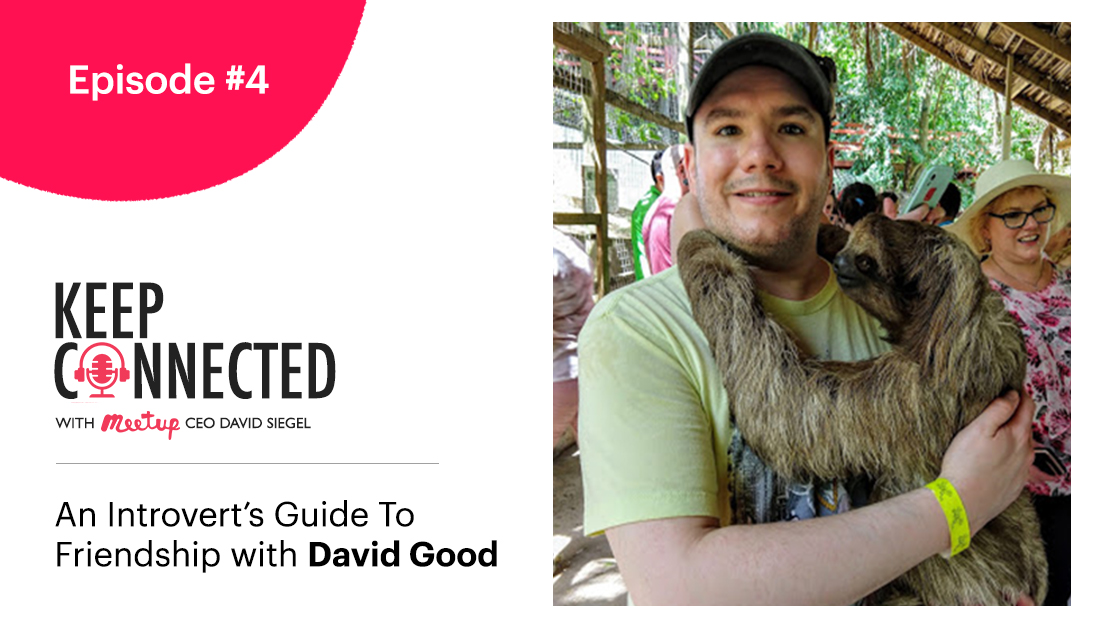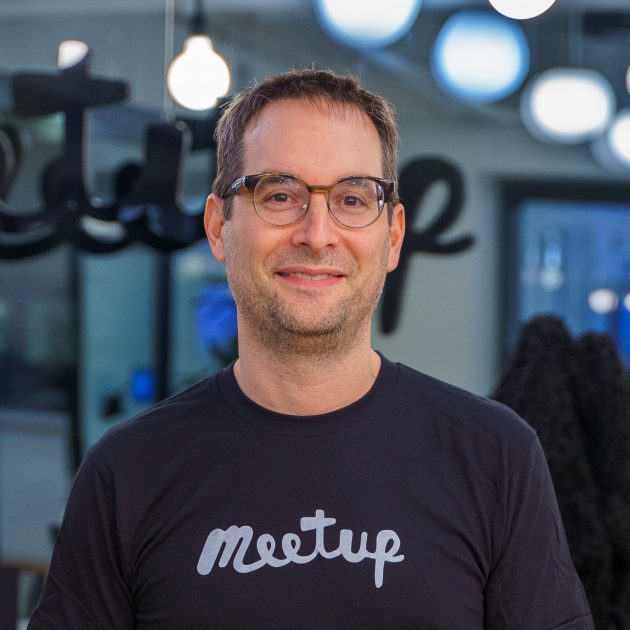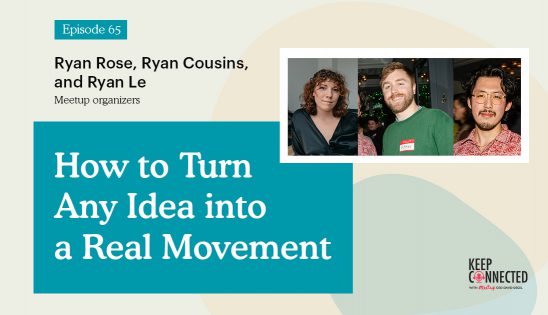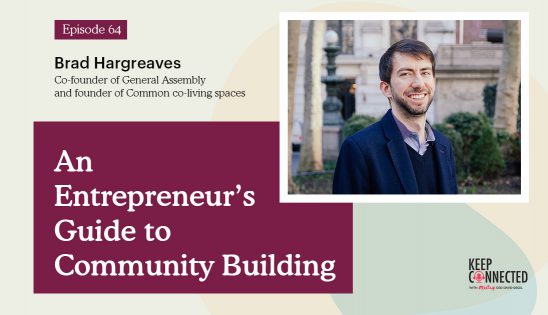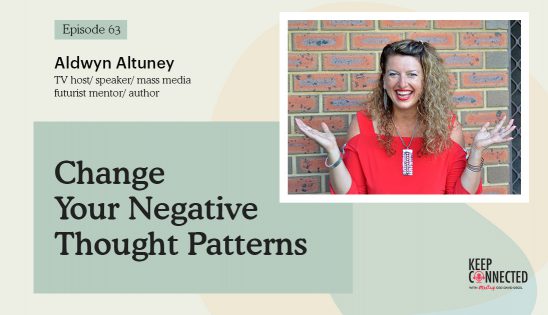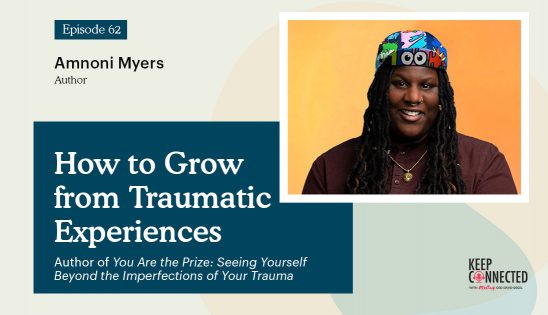As a lifelong introvert, David Good knows as well as anyone how hard it can be to make new friends. In this episode, a seasoned Meetup organizer explains why he was inspired to overcome his social anxieties to organize events for shy people to connect. David will explain how with a little perseverance, even the most socially anxious can find their people and overcome loneliness.
Ranked as one of the top 25 CEO podcasts on Feedspot, Keep Connected with Meetup CEO David Siegel is a podcast about the power of community. For more details on other episodes, visit Keep Connected on the Meetup Community Matters blog.
We hope you’ll keep connected with us. Drop us a line at podcast@meetup.com. If you like the podcast, be sure to subscribe and leave us a rating on Apple Podcasts!
Learn more about Keep Connected host David Siegel’s experience as a leader and decision maker in his book, Decide & Conquer. Pre-order your copy today!
Show Notes
This episode is with David Good. His last name speaks volumes about who he is. He is a good person and he’s a leader of three different Meetup groups. There are four weddings that have come out of those groups and maybe dozens more that he doesn’t even know about. He’s someone who’s an introvert who has truly become a leader. It’s fun to talk to CEOs, but it’s even more fun to talk to people whose lives have been impacted by Meetup.
—
Welcome, David Good. I’m so glad you’re a part of this show.
Thank you very much. I appreciate being here.
I want to talk about you and the reason why, and I hope you don’t get embarrassed, is because it’s one thing to interview people who are CEOs of companies. It’s another to interview someone who has had such a tremendous impact as a “regular person.” You’ve started three different Meetup groups and we’re looking forward to learning more about that. You’ve truly changed the lives of hundreds of people in Michigan. It is an inspiration and I’m glad you could be a part of the conversation. Let’s talk about the inspiration. Everyone has a reason why community is something that’s important to them. I love to hear a little bit about your background and your story so we could all learn from that.
I got my start doing websites in high school and then I went on to college. I didn’t graduate but I dropped out and be a full-time software developer. I went on became disabled due to a chronic migraine depression. I had a lot of years where it was hard to make friends in Grand Rapids. There weren’t many places to make friends until one day I found Meetup. I started going to a board game group and I made some friends through there, and then went to a new introverts group for about a year. I made some good friends there.
Before we even go on to the next point, what board games do you play?
It was interesting because we’d usually play new games every week, so I can’t remember them all, but I liked a lot of worker placement, strategy games, some deck-building games, things like that. One of my favorites was Stone Age and then a Roll for the Galaxy. That was a great one.
It’s a wonderful way for introverts or people to feel comfortable and meet people. We’re a big board game family, and The Settlers of Catan is something we play in our home all the time for example. Keep going. You went to the board game groups.
It was interesting because I was so nervous. At my first Meetup event, I went there, I played one game, stayed an hour, and went home because I was so nervous. Eventually, I became a lot more comfortable and the introverts group started in Grand Rapids. Maybe that was 2012 or 2013. That group ran for a little while but it got closed down and nothing replaced it. That inspired me to start my first Meetup group, Western Michigan Geeks, in the summer of 2014, and things built up from there. I started my second group, West Michigan Introverts and Shy People, a couple of years later to start that introverts group up again and make a place for people that had a lot of social anxiety that was shy. They could come and find a place to belong where everybody would be in the same situation and everybody was having the same feelings of nervousness so you didn’t need to be embarrassed by that.
Loneliness is a really big issue, and I think it’s one of the worst ways that people can suffer.
It’s important to create an environment where people understand that it’s okay to be vulnerable. It’s okay to be nervous and to share that you’re nervous. When you’re nervous or other people are nervous, it makes it more comfortable to do that. You started a third group as well. Is that right?
Yes. I decided to because loneliness is such a big issue and it’s one of the worst ways that people can suffer. It was by being alone in having no friends. The group is called Let’s End Loneliness. With the news that Meetup is going to allow us to promote online events across the whole world, rather than in our region soon, I decided it would be a good time to start that group up. We’re doing three Zoom meetings a week in that group. Between my other groups, I also do a meeting on Friday for the West Michigan Geeks group, but we’ve been getting anywhere from 6 to 12 people at the Zoom meetings. We’ve been doing fairly good, but not as good as I was hoping for. For a start, we’re doing good.
What do you think it is about you? You are not someone necessarily that was always a leader for things.
No, not at all.
How did this transformation happen that you went from nervous attendee to regular attendee to becoming a leader? What can others take away from that and how did you find the strength to do it? How did you find the courage to do it? Why did you do it in centers of people like you maybe don’t do it? What do you think it is?
I came across something called Acceptance and Commitment Therapy probably about in 2011 and went through that process. It teaches you that maybe you’re in a bit of pain, maybe you’re nervous but you can still go and do things. It teaches you diffusion methods to make those things seem not as such a big deal so that you can pursue goals that you want. One of the goals that I wanted to do was I wanted to have more friends and I wanted to meet a lot of different people and make an impact in people’s lives. I use those skills to do that and overcome some of the things that were holding me back.
Tens of millions of people could benefit from that type of help and that type of therapy. Thank you for sharing that. It’s not easy necessarily to share things about oneself. Let’s take a step back and talk about friendship, socializing, and community. In your mind, you said it’s something that you wanted to do and you were committed to doing it. Why are friendships, community, and socializing, not for you but generally speaking, so important in your mind?
I was pretty lonely for a lot of years. I had the same best friends since elementary school. I had a lot of friends that I was in contact with but then they dropped out over the years and got married, had kids, so they couldn’t hang out and stuff like that. I started to be fairly lonely and I realized that’s not a fun way to be at all. I decided if I could start these groups and help other people especially new people to the area to feel less lonely, that would make their lives a lot better.
Obviously, the saying what doesn’t kill you makes you stronger. It seems like because you went through what you went through in terms of loneliness, you’re such a stronger person because of it. It’s beautiful seeing the transformation that’s able to occur. We do a lot of studies on loneliness at Meetup. Forty-two percent of people regularly feel lonely. Among Gen Z-ers, people in their late teens and early twenties, it’s an astounding 63 percent of people regularly feel lonely. The majority of people regularly feel lonely. The challenge is that when they feel lonely, they think they’re the only ones. When in reality, they’re in the majority. What message do you have out there for the majority of the people who regularly feel lonely?
The message I would have would be to join Meetup and find some groups that you’re interested in. The trick is you have to give each group a good try. You can’t go once and decide that you didn’t make any friends and never go again. You have to give it a try for a few months before you start feeling like you belong to a group. I guarantee that you will make some new friends even if you’re shy especially in an introvert’s group or something like that. That’s been the key for me. That’s what turned my life around as far as eliminating the feeling of loneliness.
We did not tell David and say that. I promise you, everyone.
That’s just the observation I’ve had in my life.
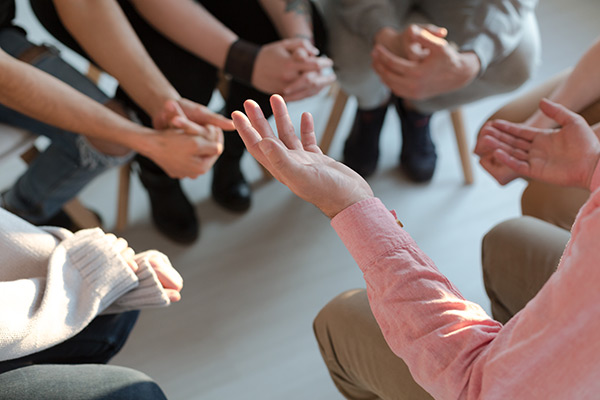
You’re speaking about a word that’s a powerful word, which is perseverance. It’s perseverance and not giving up. It’s hard to do things but it’s harder to persevere and to keep doing something that’s difficult. What you’re alluding to is not to try once but to keep trying. It sounds like that’s the advice that you would give to many.
You have to keep trying especially if you’re uncomfortable, especially if you’re more of an introverted shy person. Eventually, you will succeed if you keep trying and keep changing up what you do.
You’ve been a software developer for many years, which is amazing.
I’ve often had chronic migraines, so that’s affected when I could work. I left software development in early 2016. I realized as bad as my migraines were, the software development made things worse. Plus, I had gotten into a car accident an earlier year that injured my neck. I can’t sit at a computer that long without getting in a lot of neck pain. That’s unfortunately one other reason why I had to leave the career. I’m focused on Meetup groups and what I can do for others.
I wanted to have more friends and meet a lot of different people, and make a difference in people’s lives.
We’re lucky that’s the case. I’m sorry to hear about all the challenges. Technology-related careers are the number one users of Meetup. We have more people using and attending tech groups and learning technology and learning how to become software developers or learn how to advance in their careers than we have anything else. As someone who’s been doing software development for quite a long time, who has met many people in tech probably through your time, any thoughts on why community is particularly important for people in tech?
I can make a quick shout-out to the Grand Rapids Web Development Group. That’s always been the biggest technical group in Grand Rapids. We had quite a few of them before the pandemic happened. The important thing, to get out, to network it with others, hear about new technologies that are coming up and build your skill levels is important. Especially the networking to network with recruiters, to making sure that you’re paid fairly and that you’re working in a job where they’re treating you right, and you’re getting satisfaction out of the job. Going to a lot of these events, you’ll network with other people and learn things from them to implement in your life.
It’s not easy to network especially if you’re an introvert. Are there any things that you did whether it’s attending Meetup events, not attending Meetup events, in the event itself to make networking easier for yourself that you could maybe in part to other people that are in tech or outside of tech?
In 2013, I took a C# class put on by a coworking space downtown. The State of Michigan paid for it. Some of the people teaching that class and that were involved in those classes were involved in a lot of tech Meetup groups. When I went to the tech Meetup events, they were able to introduce me to recruiters and other kinds of big names in software development in Grand Rapids. They would introduce you to other people in similar situations. You were able to make acquaintances and friendships. When you came back to the events, you wouldn’t feel like you were there all alone, all by yourself.
It’s one thing to go to an event by yourself. It’s another thing to be able to know someone else who’s going to bring someone or to know that there’s that security blanket to have with you when you’re attending. Your advice is phenomenal advice.
Once you do something, the next time, it gets a little bit easier, and then time after that and it gets a little bit easier after that. Once you keep it up, things will get easier.
Thank you for that strengthening message. Let’s talk a little bit about something serious that you’ve certainly mentioned so far, which is loneliness. The unfortunate implication of loneliness for many people is, is anxiety, depression, etc. It’s something that millions of people especially now during the pandemic, have to go through. If someone’s in the middle of that type of situation, what do you do? What would you tell them?
I would ask to first reach out for help, whether that would be to call a hotline or calling up a psychologist, a therapist, just giving it a try once and talking to someone, see if that would help. Give it a try once a week for a good month and you could get some help out of that, get a plan to make yourself feel better, especially with the anxiety and the depression. That would be a good first step. If you have a primary care doctor that you work with or that you see once in a while for a physical, give them a call and say, “This is how I’ve been feeling. What can we do about this? Who can I contact to help deal with these feelings?”
Community as well is incredibly helpful but sometimes people are reluctant to be in a community if they’re in that place.
That’s one reason I started the new group, Let’s End Loneliness, as a way for people who are feeling those feelings to join and they can come and you don’t have to talk or participate in the call. You can come and hang out and you can chat in the chat or you can talk if you want to. It doesn’t matter.
When you look at group meetings, whether it’s breast cancer support groups or the parents of children with ADHD support groups or the tens of thousands of different support groups that we have, when you’re able to be part of a community going through some similar things as you’re going through, it can be powerful. Did you find that experience in any of the communities where people can be so different from each other but yet going through some of the same things and learning from each other?
I would say in my group, Western Michigan Geeks, over the years we’ve had a lot of quite different people. There are people who are engineers, doctors, and scientists. We have people who work a normal everyday job and they can all come together and relate because they’re both feeling some loneliness and they want to have friends around Grand Rapids in the West Michigan area.
Is it true that four weddings came out of your Meetup group?
That’s been a surprise because it’s not a dating group whatsoever. It’s a place where people can come hang out and feel comfortable. I went to two weddings in 2019. I was supposed to be at one wedding in 2020. Unfortunately, due to the pandemic, I wasn’t able to be at that wedding. Another couple, I was going to go to that wedding but they had had a wedding in their backyard with their parents due to the pandemic. They’re going to do a big reception in 2021 for everybody. They all met in our group and someone’s told me before they thought they’d be alone all their life and then they met this wonderful person in the group that they did fell in love with. It’s interesting. The people that have met are passionate about each other.
I think about what you’re doing and also think about you only know of four people.
I know there have been a lot more relationships but I tend to keep out of other people’s business. Usually, I find out when they tell me, they’re saying later, “Thanks. We’ve been together for a year and we’re happy and it’s all due to your Meetup group,” but I didn’t do much. I just created a place where people can come and feel comfortable and then the rest can happen.
You probably didn’t realize that you would be the matchmaker extraordinaire in Grand Rapids, Michigan.
I don’t know if I can say that but I’ve helped a little bit.
It’s wonderful. It speaks to the power of getting together. It speaks to when people get together, they learn. When people get together, they grow, they teach, they can mentor others but they also can meet people that will have a lifelong impact on their lives. Is there someone you could think of that you may be even met that you’re still close with or you stayed in touch with and had an impact on you?
There was a couple who were in Grand Rapids. They were with doctors and one was finishing his residency here at the ER downtown. Fortunately, a year later when he was finished, he left so they can go to Illinois and be closer to his parents. I’ve kept in touch with them a little bit and that’s become a fairly meaningful friendship that I have. Also, there’s another couple. They still live in town but I was friends with her before I started my Meetup events. I’ve met her through the original Introverts Group. We’ve been friends since then. She was one of the ones she met her husband through the group. That made me happy.
Let’s talk about extroverts. One of my beliefs as a CEO of a company that’s had many introverts and extroverts work for my companies over the years is that companies and businesses and sometimes the world tend to reward extroverts. They do not give introverts, shall we say, enough of a fair chance. Meaning if you’re interviewing for a job and you’re an extrovert and you think very fast on your feet, that makes you a better interviewer. It doesn’t necessarily make you better at your job. Oftentimes people who are, frankly, the best in their jobs that I’ve seen are introverts. Let’s talk about that. How could the world, how can people make it a better, easier place for introverts? It’s not fair that they’re not given oftentimes unfortunately as enough of a chance.
Once you do something, the time after that it gets easier.
People would need to watch and give people that are shy more of a chance. Sometimes, people that are shy, they’re a little bit better at their jobs as they keep their heads down. They’re less likely to get distracted by other people. That’s a good question.
David, one of the things that we try to do at Meetup and the company is before meetings, we create a document, have everyone read the document, and ask everyone to then comment on the document beforehand. It’s not like once you’re in the meeting, the loudest voice wins. It’s the most thoughtful voice wins. Oftentimes that thoughtful voice will come more from an introvert than from anyone else. Leveling the playing field is incredibly important. Any last advice for Meetup organizers to become a little more successful at organizing? We talked about members and what they can do, but you’ve been a very successful organizer. You’ve had many people come to your groups. Give us some advice on how do you market the group? How do you promote the group? How do you build content for the group? How do you make the group feel comfortable? What advice do you have first for organizers who are reading this?
I guess the most basic advice I would have is to make sure that once you set up a group, you need to make sure you give it at least a good six months before you decide if it’s working or not. You need to do a Meetup event too. You need to be consistent. You need to go if there are two people signed up, you need to go if there are twenty people signed up. If you keep doing those things, you’ll be successful.
Perseverance is coming through again.
It’s a good series of books I like. It’s The Go-Giver series of books by Bob Burg. It’s about how you can be successful through giving rather than taking. It’s an inspirational series of books that have tried to integrate some of the principles into some of my life.
You’ve thought about this a lot within the actual Meetup event itself. Any other advice you would give to an organizer to make that event to be as meaningful for everyone who’s attending to get people to return?
I guess that you need to be easy going and you need to make sure to talk to every new person that comes in, introduce yourself and maybe ask them a couple of facts about themselves. Sometimes it’s difficult because someone comes and you aren’t sure if they’re extremely shy and nervous and they want to be more left alone. When they’re shy and nervous if they want someone to start talking to them and put them on the spot that they have to introduce themselves. It’s something I haven’t been able to determine 100%, but we try to engage everybody that comes and makes sure that everybody has someone to talk to.
Greeting, reaching out, checking in, that’s wonderful advice. Thank you. Is there any other either last advice or message that you want to give to the many people who are reading this?
If you’re feeling lonely, either go to a Meetup and give it a long try or even start your own Meetup if there’s no interest group in your area and give that a good six months. Try. A year later from then, you’ll see that your life has changed. You’ll see that feeling of loneliness has decreased.
I hope many people take you up on it. Obviously, not because I’m the CEO of Meetup but because it can help to change people’s lives. David, if you’re open to it, I’d love to ask you some rapid-fire quick questions. Let’s start with the first one. What is the one time that community has helped you the most?
I’ll share something personal. I went through a bad relapse of depression a few years ago. My Meetup groups gave me a reason to keep pushing myself forward and keep going on because I knew it’s real. When you have depression, it’s really easy to isolate yourself. Every doctor you talk to will say, “That’s the exact opposite of what you need to be doing.” I saw all these people are coming to my Meetup events and they depended on me because they probably didn’t have many friends in the area and they wanted to make new friends. That was the reason to force me to do it. I would say that’s the answer to the question there.
I’m glad to hear that you’re in a better state now. Tell us about your favorite quote.
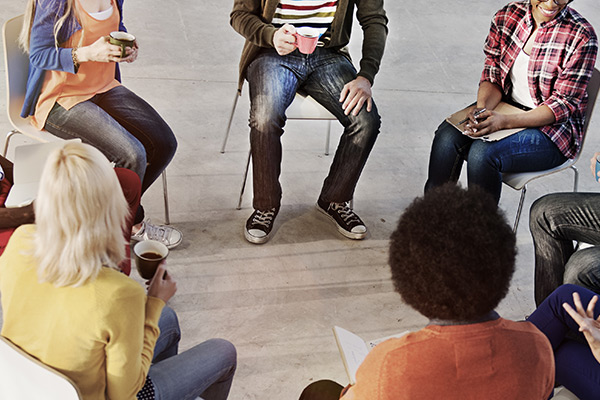
There is one. I don’t know who it’s attributed to but it talks about like, “If you want to have something in your life, you need to start giving that to others. Eventually, you’ll find that comes back to you.” I heard it a long time ago and I always thought that was a good thing.
There’s even a concept in religion that if you have a challenge and you pray for other people, then that will help you as well. That’s consistent with what you had said too. What is your favorite leadership book? You’ve already talked about a great book so that might be it.
I want The Go-Giver series of books and that would be it.
What was your first job?
My parents had a dairy farm but I was pretty much allergic to everything on the farm, so I wasn’t able to work there but I did give it a try a little bit when I was fifteen. I found that wasn’t for me, so I worked at McDonald’s for nine months. After that, I quit and I taught myself to build websites and I started my first business doing websites when I was sixteen.
You had both sides of the cow, perhaps the live cow on the farm and the not as live cow at McDonald’s.
My whole family is a family of farmers and I was the only one interested in science and tech. It made me the odd man out a little bit.
In terms of the world nowadays, there are many more people interested in science and tech and hopefully, you found your people whether through Meetup and otherwise. When’s the first time you saw yourself as a leader?
That would be when I was starting to get decent-sized numbers of people to come to the Meetup events like 12 to 20 people or more, then I realized that these groups are working and I am doing something that the community wants. That would be it.
The last question is about how you’re doing many different things for many different people. David Good, what do you want to most be remembered by?
What I would want to most be remembered by is that I was someone that helped people and that I was someone that worked to reduce the suffering of others especially as far as loneliness goes.
You may be in a bit of pain or really nervous, but you can still go and do things.
I have every confidence in the world, David, that you will hopefully live a very long time. That is something that you will undoubtedly be remembered by everyone who knows and loves you. All I would say is you are an inspiration. You’re an inspiration to the millions of people that are like you, the tens of millions of people that also could be different than you. Thank you for stepping up and being vulnerable and sharing all that you shared. Life is always better together. You love that and you embody it and you teach others that. Thank you.
I thank you very much. I appreciate the opportunity.
—
I enjoyed talking to David. It was a particularly meaningful episode for me on a personal level. There are people in my life who suffer from anxiety and depression. It’s inspiring to see how David Good rose out from that to become the leader that he is. My biggest takeaway is how anyone can become a leader. If you enjoy this episode, subscribe to keep connected, and feel free to review us. Make it five stars, we don’t mind. Remember, keep connected because life is always better together.
Important Links & Resources on Making Friends:
- David Good
- Western Michigan Geeks
- Let’s End Loneliness
- The Go-Giver
- Tips For Making Friends as an Adult
About David Good
 David Good has lived in the Grand Rapids, MI area all his life where he was a software developer that got his start developing websites in high school.
David Good has lived in the Grand Rapids, MI area all his life where he was a software developer that got his start developing websites in high school.
Having to quit due to disability, he now devotes his time to his three Meetup groups.
He created his first Meetup group six years ago. The focus is to make others’ lives better by helping them to make new friends. His overall goal is to help end loneliness.
Last modified on June 27, 2023

